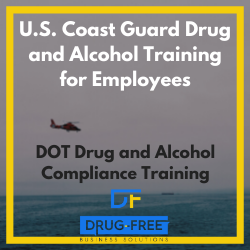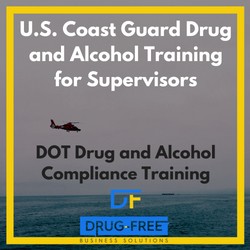You may have been asking, “When does the Coast Guard drug test?” There are six specific situations in which Coast Guard supervisors are supposed to administer a drug test: post-accident, pre-employment, post-rehab, follow-up, random, and reasonable suspicion drug testing.
When drug and alcohol testing is necessary, Coast Guard supervisors should make use of a DOT 5 panel test. This test checks drug and alcohol levels for alcohol, amphetamines, marijuana, opiates (a.k.a. narcotics), and phencyclidine (PCP).
This course discusses a four-step process for administering a reasonable suspicion Coast Guard drug test and provides marine employers drug testing guidance.
In the course you will learn:
Step One: How To Remove The Suspected Employee From Safety Sensitive Positions
We discuss how you, as the supervisor, should remove the suspected employee from their position. The main key is that you do it promptly. Any delay means greater risk of an accident and injury.
Then we go into greater detail in how you must confront the suspected employee, leading us into step two.
Step Two: How To Confront Suspected Employee With Present-Time and Clear Observations
You must lay out clear and specific observations that lead you to believe the employee is under the influence, and you must articulate your observations to the suspected employee.
Most people will not be overly keen on being accused of intoxication on the job, but if you suspect it, you have to get a drug test immediately. So it is important that you speak clearly and calmly to the employee, making it clear that they either take the drug test or they will have to deal with some fairly significant consequences.
You, as the supervisor or employer, cannot legally have employees suspected of using on the job not getting drug tested. So the situation cannot be taken lightly.
Step Three: How To Do a Coast Guard Drug Test For Reasonable Suspicion When Warranted
The Coast Guard uses a DOT 5 panel test. We go through the process of administering the drug test in a safe and effective manner.
To ensure both safety and accuracy, you have to know the procedures of carrying out the reasonable suspicion drug test. Otherwise, you put the recipient at risk for injury as well as inaccurate test results.
Step Four: How To Act On Test Results In Accordance With USCG Coast Guard Drug Policy
We then explain how you should act on the DOT 5-panel drug test results. We go over how you handle passed drug tests as well as DOT drug test failures.
Timely action and confidentiality are vital in this step. The DOT and USCG have standards and policy for how you receive and send drug test results information.
The USCG reasonable suspicion drug testing process is straightforward, but it contains several rules that you need to know if you are to do it properly. We make sure you know those rules well.
Check out our USCG Supervisor Training Program, which is our only training program to include this course.

